
Commission Recommends Major Overhaul Of Washington Sentencing Laws
Listen
Nearly four decades ago, Washington became one of the first states to abolish parole and adopt a “fixed” sentencing grid with the goal of ushering in an era of “truth-in-sentencing,” while also reducing disparities in sentences.
In the 38 years since, myriad changes have been made to the state’s sentencing laws – including voter-approved mandatory minimums and sentencing enhancements — but the design of grid itself has remained essentially unchanged.
Today, critics say, the system has evolved into a complex thicket that ties the hands of judges and has forced the Department of Corrections, in the wake of an early release scandal, to resort to manually calculating inmate release dates.
Now, the state’s Sentencing Guidelines Commission, tasked with promoting accountability and equity in sentencing, has adopted a report to the state Legislature that urges lawmakers to consider two options for modernizing the grid with the twin goals of simplifying sentencing and increasing judicial discretion.
The commission, which includes judges, prosecutors, and defense attorneys, formally adopted the report at a meeting in Olympia on Friday.
While the commission unanimously supports giving judges more discretion, it is not unified on how to do that. As a result, the commission put forth two proposals for updating Washington’s sentencing grid.
Under the first option, Washington would retain the existing grid, but most of the sentencing ranges – known as prison term cells – would be expanded to give judges more flexibility.
“This sentencing scheme accomplishes the goal of allowing judges broader discretion, especially in cases involving lower level felonies, while also maintaining the original goals and structure of the [1981 Sentencing Reform Act],” a draft of the report said.
Option two would represent a wholesale overhaul of the sentencing grid with a greater focus on simplifying sentences and giving judges even more discretion.
Under this approach, Washington lawmakers would adopt very broad “mandatory” sentencing ranges for felony crimes. Within those wide ranges would be a second set of more targeted “advisory” ranges that judges would be presumed to sentence someone within. However, judges could go outside those advisory ranges if they determined there were aggravating or mitigating factors that justified a longer or shorter sentence.
The goal of this approach would be to allow judges to hand down more individualized sentences.
“[This] proposal puts the courts back in the business of deciding what sentence is appropriate for a defendant on a case-by-case basis,” said the draft report.
The report also recommends the state:
- Assign a seriousness level to all “unranked” felonies, such as intentional injury or death to a service animal. The goal would be to reduce confusion and increase transparency.
- Increase the use of pre-sentence investigations to give judges more information about defendants at the time of sentencing. PSIs, as they are known, are common in the federal courts.
- Allow judges discretion on when to apply sentencing enhancements and allow individuals to serve enhanced sentences concurrently, instead of consecutively, as is currently required.
- Overhaul how Washington’s community supervision program works so that the Department of Corrections can focus more on individuals who are most likely to reoffend.
The commission’s recommendations were crafted with the assistance of the Council of State Governments Justice Center, a non-profit that provides expert assistance to state and local governments on criminal justice issues.
In addition to reducing complexity and giving judges more discretion, the commission was tasked with reviewing the state’s existing Sentencing Reform Act with an eye toward: furthering public safety, ensuring sentencing is evidence-based and reducing recidivism.
Currently, 33.5 percent of former inmates return to Washington prisons within three years of being released, according to the Department of Corrections.
The chair of the commission, Russ Hauge, a former Kitsap County Prosecutor, said the last overhaul of Washington’s sentencing structure, in 1981, came at a time when the pendulum had swung from a more rehabilitative view of criminal justice to a more punitive “we can’t change their behavior” approach.
Today, Hauge says, current research shows there are steps states can take to reduce recidivism and he argues Washington’s sentencing policy should be updated to reflect that.
“We’re using a sentencing system that we know does not address the needs of our communities and the needs of the offenders who run afoul of our communities and so we’re, in effect, wasting time and money by sentencing the way we are now,” Hauge said.
Hauge added that sentencing reform is not a partisan issue.
“I think that everybody understands that we need to make some changes,” Hauge said.
Asked if giving judges more discretion in sentencing could result in more disparities in sentencing, Hauge said: “That is a fear and we can’t say that it won’t happen to some degree.”
But he added that the goal would be to give judges additional information about the individuals they are sentencing and more tools to ensure sentences are ultimately fairer and more effective.
King County Superior Court Judge Roger Rogoff, who serves on the commission, argues that disparities already exist in how crimes are charged and plea bargained.
His view is that under the current system, prosecutors wield much of the power.
“They really run the system at this point,” said Rogoff, who worked as a state and federal prosecutor before becoming a judge.
Rogoff notes that most criminal cases end with a plea bargain and usually the proposed sentence is agreed upon beforehand between the prosecutor and defense attorney.
“They’re saying ‘we’ve decided what the right answer is and judge you don’t have very many choices about disagreeing with us,’” Rogoff said.
Rogoff argues by giving judges more discretion, and more information about the defendant, sentencing decisions can be brought “back into the public eye with the judges where it’s supposed to be constitutionally.”
Rogoff and Hauge both spoke on TVW’s “Inside Olympia” program.
Now that that the commission has formally adopted its report to the Legislature, implementing the recommendations will fall to the Legislature.
In anticipation of the report, lawmakers this year created a new Washington state criminal sentencing task force which will review sentencing laws and consider the commission’s report. In addition to lawmakers and representatives of the criminal justice system, the task force will include people who have formerly been incarcerated as well as crime victim advocates.
The William D. Ruckelshaus Center at Washington State University will support and facilitate the work of the task force with reports due to the Legislature in December of this year and December of 2020.
Republican state Rep. Brad Klippert, who sits on the Sentencing Guidelines Commission and is a Benton County sheriff’s deputy, said Friday he supports simplifying sentencing and giving judges more discretion, but he also wants to make sure “justice has been served” after a crime is committed.
“[The sentence] has got to be stiff enough that the person who commits the crime never wants to do it again,” said Klippert who is also the ranking Republican on the House Public Safety Committee.
Asked if the Legislature is likely to take action on sentencing reform in the next couple of years, he said: “I see an openness on the Legislature’s part to listen and to make the changes we need to make.”
State Rep. Roger Goodman, the Democratic chair of the House Public Safety Committee, called the commission’s work “a foundation” for the upcoming work of the task force. He said he was reserving judgment on which of the grid options is superior. But he said he fully expects the Legislature to take up sentencing reform over the next two years.
“I think there’s a strong likelihood that we will significantly amend the Sentencing Reform Act and it won’t just be the grid,” Goodman said. “It’s way past due for us to be working on this in Washington state.”
Related Stories:

Clear Your Record Of Simple Possession? Not That Easy But You Should Try
In February 2021, the Washington State Supreme Court ruled that the State’s felony drug possession statute was unconstitutional. This decision, known as State v. Blake, has far-reaching impacts that affect anyone previously convicted of simple possession of a controlled substance.

Washington’s First Native American Supreme Court Justice Works So She Won’t Be The Last
Washington Supreme Court Justice Raquel Montoya-Lewis didn’t meet a lawyer until law school. Now she wants others from underrepresented communities to picture themselves in the legal system.

From Marijuana To Mushrooms, Voters Want Drug Laws Eased, Following Washington State’s Lead
Several states approve marijuana for recreational and medicinal use. Oregon votes to decriminalize possession of small amounts of hard drugs.















